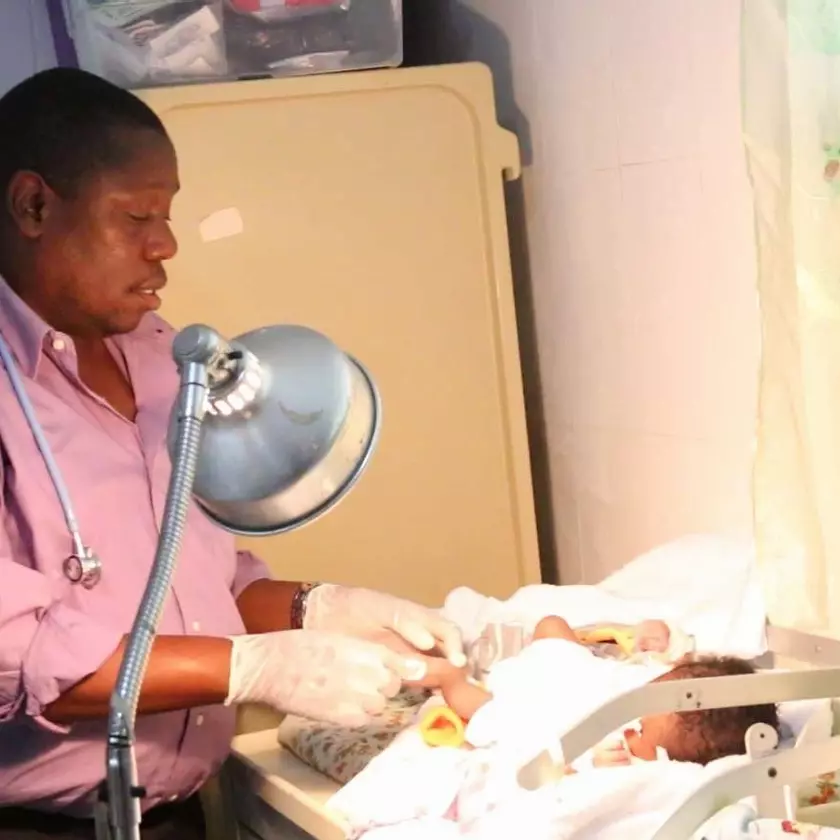Haitian Medical Director's Response to Aid Scandal
In light of the recent Haiti aid scandal and on-going questions over international aid, the Medical Director of Hospital HCBH, Dr Paul Toussaint, has written the below reflection. It's perhaps a longer blog than normal, but a very insightful reflection from the perspective of one of Haiti's leading Paediatricians:
Charities have been present in Haiti since the 1950's. But following the tragedy of January 12th 2010 that caused the death of more than 200,000 people, the situation seemed to collapse. Many organizations then arrived in mass as Haiti gained the name; "a republic of NGOs".
Charities work in many sectors: Water, sanitation, health education, human rights etc. But why so many organisations? What are the results? We are asking these questions perplexed.
Haiti is an underdeveloped country with a young population, 70% under the age of 40. 65% is unemployed. In the meantime, there is no economic growth. GDP has increased very slightly. Only 30% of the population of cities have access to running water. The unbridled deforestation pushes farmers to settle in cities, transforming very large slums without sanitation and no possibility to evacuate waste, so that Haiti has become the third most urbanized country in Latin Americas. Infant mortality is the highest in the region. The vast majority of agriculture is unable to support local families, leaving 40% of the population with limited access to food and also health services. Haiti subsequently imports 40% of food products. 80% of schools are managed by private sectors (religious or secular). Maternal mortality is very high, while only 4% of the national budget is allocated to health.
The Haitian Government seems unable to meet the basic needs of the population which justifies the presence of these charities (NGOs) to help the poor. However, in many cases, most of these organisations do not fulfill their mission. The report of failure is visible. We have been standing still for more than 50 years. How can we explain it?
Too proud to listen and respond to the real needs of the population, deliberately maintaining the status quo, perpetuating their presence and dependence in the country, Haitian Professionals in most cases are totally ignored or put aside in decision-making. In other cases the projects do not correspond to the desire of the population. This is somehow one of the causes of the failure in this influx of NGOs.
Why many of these organizations are frowned upon by a fringe of the population? The scandal with Oxfam has completely discredited the charitable organizations. This act is reprehensible and deserves to be punished with all the rigor.
However, we do not want to see an amalgam and put all the charities in the same basket. This would be like showing a short sighted reality. There are many which are highly respected and their leaders have shown loyalty, love, compassion and Christian charity. I want to quote as an example "HOPE HEALTH ACTION (HHA)" whose achievements are palpable and visible. It is a very big success. Indeed this Organization collaborates and finances one of the most visible hospitals in the North of Haiti, Hospital HCBH.
HHA's collaboration dates from 11 years. Little by little the hospital has grown to become a 100-bed hospital giving care to more than 20,000 patients per year in various fields: Rehabilitation is a novelty in the North of Haiti. HHA is the pioneer. Before a person with a spinal cord injury was convicted to death in a few weeks. Now many people are taken care of and return to the market of employment. A level III maternity facility with more than 1,500 deliveries a year, thus reducing the number of women giving birth at home without assistance. A neonatology service working with an occupancy rate of nearly 90% due to its good reputation. In addition they have many community-based actions, especially engaging with traditional birth attendants, reducing maternal and perinatal mortality. Thanks to HHA, fewer people died of Cholera by putting an ambulance service at the disposal of the department to bring people affected to hospital. They've helped develop an emergency service equipped 24/7 to deal with cases of accidents, and pioneered a Respite Center for Children with Disabilities giving those children the hope and love they deserve. Such children are rejected most of the time by the Haitian society.
What made HHA successful? And that's my plea. I'm a privileged witness of their work until today, and so it seems appropriate to write this text as testimony.
Unlike other organizations, HHA has always accepted Haitian leadership which has allowed a better penetration and acceptance by the community. HHA makes a transparent and integrated approach to its various programs, avoiding any frustration. Thus, no decision is made without a prior agreement between the leaders of HHA and the Haitian or community leadership.
HHA encourages the transfer of skills through the continuing education of European or American professionals who regularly come to share their experiences in all humility, love, and mutual respect with the Haitian professionals in all areas: Medicine, leadership, finance, biotechnology etc. So they are working to build our capacity and the emergence of a new group of workers. HHA supports nearly 300 Haitian employees. HHA empowers the local management team to be as independent as possible.
I had the chance to visit HHA in England in 2017. I did not notice that they are a people who get rich at our expense. I was touched by their love and their desire to help. If you have not visited Haiti yet, we invite you to join HHA and you will be amazed by the progress made through our work together. I therefore encourage HHA to continue to support Haiti and elsewhere, as is already the case in South Sudan.
I make myself a personal advocate of HHA as this is for me the best way to help sustain their action.



